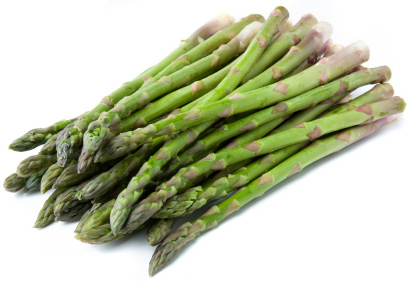Asparagus

Although over 300 varieties of asparagus are known to exist, only about 20 are considered to be edible. With its origins in the Mediterranean, this vegetable has been used medicinally for about 2000 years.
Asparagus contains purines, which break down to form uric acid, so people prone to kidney stones, gout, or other uric acid-related problems, may want to avoid eating this vegetable. A more harmless side-effect of eating asparagus is the presence, soon after eating it, of a strong odor in the urine caused by the natural formation of various compounds.
Asparagus is best when used within a day or two of purchase. Store in the refrigerator with the ends wrapped in a paper towel to prevent the spears from drying out.
| Serving size: | 1 cup, chopped |
| Region: | Mediterranean, United States, Mexico, Peru, France, and Spain |
Health Benefits
| Colon | Contains a type of carbohydrate called inulin, which feeds the healthy bacteria in our large intestine, thereby making it more difficult for harmful bacteria to thrive. |
| Joints | Traditionally used to treat arthritis, rheumatism, and other conditions caused by inflammation. Its diuretic properties (resulting from high potassium, low sodium, and presence of the enzyme asparagine) may be responsible for its effectiveness against these ailments. |
| Menstruation/PMS | Sometimes effective in alleviating PMS-related water retention, due to its diuretic properties (resulting from high potassium, low sodium, and presence of the enzyme asparagine). |
| Weight Loss | A high nutrient, low calorie food. |
Nutrients
| Copper | 0.3 mg | 15% | |
| Fiber | 2.8 g | 11% | |
| Iron | 2.9 mg | 19% | |
| Vitamin A | 1013 IU | 20% | |
| Vitamin B1/Thiamin | 0.2 mg | 13% | |
| Vitamin B2/Riboflavin | 0.2 mg | 12% | |
| Vitamin B9/Folate | 69.7 mcg | 35% | |
| Vitamin K | 55.7 mcg | 70% |
